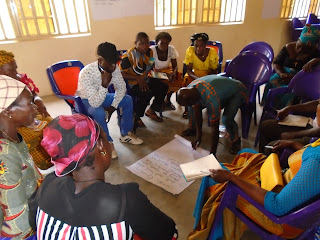Gender Mainstreaming training - Obollo, Enugu Nigeria
30 selected Indigenous women and men of Ajorogwu were
trained on Gender mainstreaming
information documentation and storage in line with the AYNI fund -FIMI
supported project on promoting gender equality among the women of Ajorogu.
The participants were selected based on the
ability to read and write largely because the action plan is for the trained
participants to make meaningful impact in the community policy making
organ. Based on permission obtained from
FIMI, men were included in this training which were originally prepared for women. This step was taken based on the
lesson learnt from the previous gender equality training were the women highlighted that for the
project to achieve the desired objectives, their men should be part of the
training so that they are better
informed thus creating the enabling environment for implementation
CASE STUDY.
• GENDER-SENSITIVE LANGUAGE – must be
equal. Applies to forms, documents, adverts, films, posters, choice of images.
Eg MTN “mama na boy” – this advertisement by a mobile network “MTN” is not
gender sensitive. It tends to show that it has bias for the male child and that
the male child is more important than the girl child. It showed the delivery of
a baby and a seeming announcement of the arrival of a “baby BOY” thus
brightening the face of a father who had 3 girls previously.
• Gender-specific data collection –
collect, analyze and present by gender. That all data collected should show sensibility
in dis-aggregation. It should account for how many boys or men and how many
girls or women captured by the data.
• Equal access to and utilization of
services – services and products accessed as to their different effects on
women and men. Access to social services in the community should not be made
stringent for the women and girls in favour of the men or vise versa.
• Men and women are equally involved
in decision making. Women should not be excluded when it comes to decision
making, the training has brought out the best in the men who agreed more that
women inclusion in the decision making process will help move the wheel of
progress faster in contemporary times.
• Equal treatment is integrated into
steering processes. The rules should not be bent to suite any particular gender
because of the smilingly wrong notion that it is only the opinion of men that
counts in governance of the community.
On issue of information gathering, the participants had
identified the need for information gathering, they agree that:
- Information helps them know what is happening
around them
- Help them identify which news if true or fake Information helps leaders to rule well. They
cannot rule if they are not well informed - Information helps the ruled and the rulers
relates very well.
And
that in the time past, their community had a way of gathering
information and documenting such as:
-
Town criers
-
Group discussion
-
Print media such as text book, journal,
newspapers
-
Electronic media such as radio and Tv
-
Diary
-
Note books
-
Natural event that occur at a specific period
e.g. Okorokpo, Igwurube season
-
“marks on the wall”
-
“Ego eyori” Cowries counting
Planting of trees to mark an event



No comments:
Post a Comment